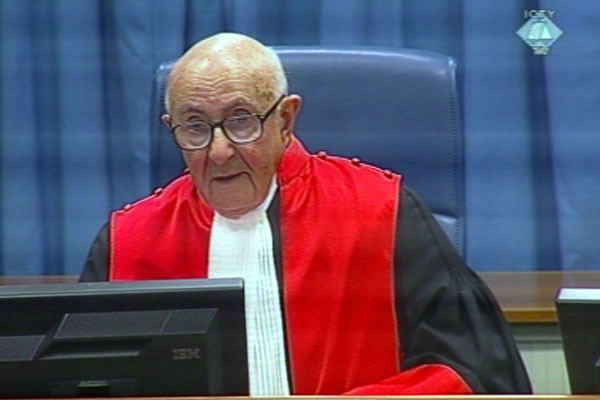Home
SPECIFIC DIRECTION OF APPEALS CHAMBER’S LATEST JUDGMENTS
In the wake of Momcilo Perisic’s judgment (3)
What is the ‘specific direction’ of the judgments acquitting Gotovina, Markac and Perisic? What is the majority in the Appeals Chamber aiding and abetting here?
 Theodor Meron, president of the MICT
Theodor Meron, president of the MICT One interpretation of Momcilo Perisic’s acquittal is that the Tribunal wanted to show that it was not ‘entirely anti Serb’, just as the Republika Srpska Army was not ‘entirely criminal organization’, as the appellate judgment found.
In an article eloquently entitled A Requiem for a Court, authors Srdja Pavlovic and Christophe Solioz express their hope that the judgment is the ‘final parting gift’ before the Tribunal closes its doors for good. They note that all the other sides in the conflicts in which war crimes in the Tribunal’s jurisdiction were committed have already received similar gifts: the acquittals of Ante Gotovina, Ramush Haradinaj, Naser Oric and Ljube Boskoski.
If that was indeed the motivation behind Perisic’s acquittal, the goal was achieved in part. The Serb officials’ reactions were positive indeed but there was no euphoria as there was in Croatia following Gotovina’s acquittal. On the other hand, the judgment only strengthened the public’s deep-rooted skepticism and contempt towards the Tribunal, providing fresh fodder for scornful comments at the Tribunal’s expense.
Two interpretations of Perisic’s acquittal dominated the public space in Serbia. It was an ‘obvious attempt to compensate’ for the acquittal of Gotovina, Markac and Haradinaj, based on the principle ‘one Serb general for two Croat generals and one Kosovo general’. The ‘compensation’ effect was greatly reduced by the fact that in Serbia, Perisic is not nearly as respected and popular as Gotovina in Croatia and Haradinaj in Kosovo.
Another common explanation is that Perisic was acquitted because he was ‘America’s man’ and the CIA ‘takes care of its minions’. It was therefore no wonder that he was acquitted by the Appeals Chamber presidedby an ‘American judge’. In Serbia, Perisic was suspected of delivering confidential military documents to an American diplomat but the case was dropped when Perisic surrendered to the Tribunal.
Perisic was acquitted because the majority in the Appeals Chamber found there was no evidence that the logistic, material, personnel and other aid Perisic provided to the Serb armies in Bosnia and Croatia as the Chief of the VJ General Staff was ‘specifically directed’ at the commission of crimes. Consequently, Perisic couldn’t be convicted for aiding and abetting those crimes.
If we were to apply the ‘specific direction’ criterion to the majority of the judges in the Appeals Chamber, we could conclude that the acquittals of Gotovina, Markac and Perisic are not ‘parting gifts’ for Croatia and Serbia but to someone else. This in turn would lead us to a paradoxical conclusion that the judgments that inspired articles such as Requiem for a Court in fact represented the confirmation of the Tribunal’s success and proof that its decisions were relevant for future international criminal jurisprudence.
Why is that? If the Tribunal’s decisions weren’t relevant, no one would try to tailor them to their own needs, but would simply ignore them.
In Gotovina’s and Markac’s case, the majority made sure that no ‘injudicious legal standard’ for the use of artillery in built-up areas was part of the Tribunal’s legacy. Such standards would restrict the freedom of military commanders to select targets and take advantage of their long-range artillery. In the appellate proceedings, the defense of the Croatian generals openly alluded to the ‘dangerous potential’ of such restrictions; so did the military academic lobby, comprising law professors serving in the armed forces and retired senior officers who served as legal advisors or judges in the American, British or Canadian armed forces.
After the acquittal, General Perisic’s defense counsel said he was ‘particularly proud that a small defense team, independent of any lobbying firms and other institutions, managed to challenge the prosecution case’. There was hardly any need for lobbying, as General Perisic’s case had even more of the ‘dangerous potential’ than the Gotovina case: the danger that the Tribunal may restrict, by applying an ‘injudicious legal standard’, the ability of states to aid and abet ‘rebel’ or ‘democratic’ forces in other countries such as Syria, Libya or Sudan, by providing them with arms, ammunition, or logistics support. Or worse, to expose those providing aid to the risk of criminal prosecution for the crimes perpetrated by those who received their aid. This was the main argument of Perisic’s defense in the appellate proceedings and at the appellate hearing. The message was obviously received loud and clear.
This could lead to the conclusion that the Appeals Chamber’s latest judgments are ‘specifically directed’ at dismantling the ‘dangerous potential’ of the Tribunal’ case law legacy.
Mirko KlarinLinked Reports
- Case : Perisic
- 2013-03-05 JUDGES COULDN’T SEE THE WOOD FOR THE TREES
- 2013-03-04 NO CONSISTENCY OR RIGOUR
- 2013-02-28 APPEALS CHAMBER ACQUITS GENERAL PERISIC
- 2014-02-03 PROSECUTION ASKS FOR RECONSIDERATION OF PERISIC JUDGMENT
- 2014-02-14 DEFENSE: PERISIC’S JUDGMENT IS FINAL
- 2014-02-20 PROSECUTION RESPONDS TO PERISIC: ‘FINALITY’ OF JUDGMENT IS NOT ABSOLUTE
